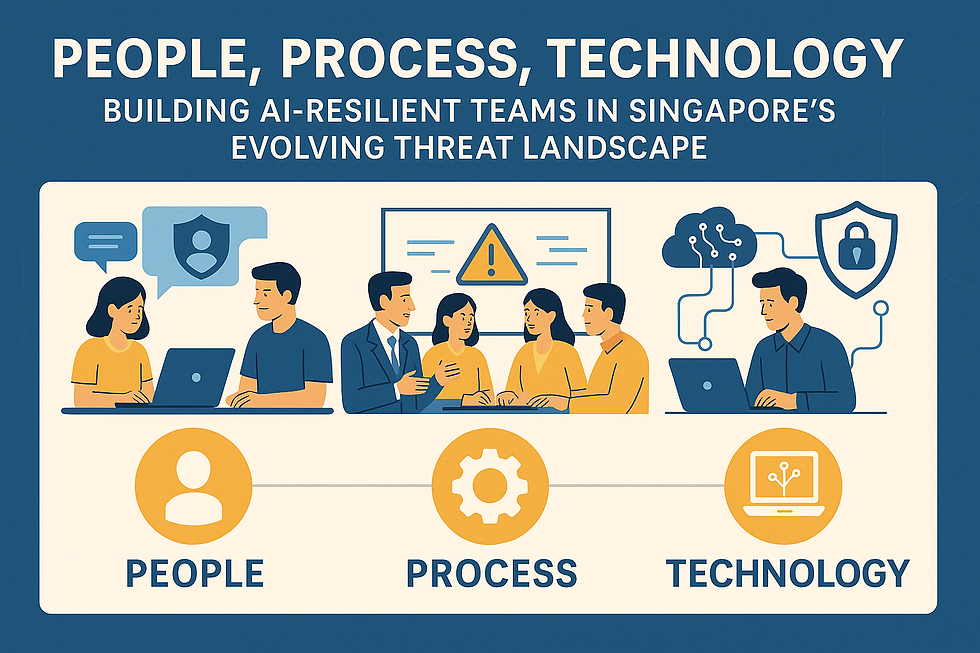Why Corporate Security Companies Need CSA's Cyber Essentials Certification and IMDA's Data Protection Essentials Program
- MZT

- May 2, 2024
- 3 min read
In the digital age, corporate security is no longer just about locking doors or installing alarms; it extends into the vast and vulnerable realms of cyber space. As cyber threats evolve in complexity and intensity, the necessity for robust cyber defenses escalates. For corporate security companies, acquiring certifications like Cyber Essentials (CE) and the Data Protection Essentials (DPE) from the Infocomm Media Development Authority (IMDA) isn't just beneficial; it's imperative.

From Cybersecurity Health Report 2023

From Cybersecurity Health Report 2023
Here’s why:
Understanding Cyber Essentials and Data Protection Essentials
Cyber Essentials (CE) is a foundational certification aimed at guiding businesses in protecting themselves against cyber threats. Originating from the Cybersecurity Agency of Singapore (CSA), CE helps organizations implement basic but essential cybersecurity measures. It focuses on critical areas like secure configuration, boundary firewalls, access controls, patch management, and malware protection.
Data Protection Essentials (DPE), also orchestrated by IMDA, focuses on the fundamentals of data protection compliance. It assists companies in establishing practices that ensure the safety and privacy of personal data, aligning with Singapore’s Personal Data Protection Act (PDPA). This certification is particularly crucial for companies handling sensitive personal information, ensuring they comply with legal and ethical standards.

Strengthening Cybersecurity Posture: Cyber Essentials provides a clear framework for protecting against a wide array of common cyber threats. By adhering to this framework, corporate security companies not only safeguard their own data but also fortify the defenses of their clients’ systems.
Building Trust: In an industry where trust is paramount, having recognized certifications like CE and DPE demonstrates a serious commitment to cybersecurity and data protection. This can significantly boost client confidence and distinguish a company from its competitors.
Ensuring Compliance: With data breaches and cyber-attacks on the rise, adhering to recognized standards helps companies stay compliant with national and international regulations. This reduces legal risks associated with data breaches and non-compliance.
Enhancing Competitive Advantage: As businesses become more aware of cyber risks, they prefer to work with partners who are certified in cybersecurity practices. Certifications like CE and DPE can provide a competitive edge in the marketplace.
Mitigating Risks: Implementing the structured approach recommended by CE and DPE helps identify vulnerabilities early, reducing the likelihood and impact of cyber incidents and data breaches.
Implementing Cyber Essentials and DPE
For corporate security companies, the process of obtaining CE and DPE certifications involves several steps, including:
Gap Analysis: Assessing current cybersecurity practices against the standards set out by CE and DPE.
Plan of Action: Developing a comprehensive action plan to address any gaps in compliance and enhance overall security posture.
Training and Awareness: Conducting regular training sessions for staff to ensure they are aware of best practices and procedures related to cybersecurity and data protection.
Regular Audits and Reviews: Continuously monitoring and reviewing the effectiveness of implemented measures and making adjustments as necessary.

For corporate security companies, the journey towards achieving Cyber Essentials and Data Protection Essentials certification is not just about fulfilling a regulatory requirement; it’s about setting a benchmark in cybersecurity and data protection practices. In an era where cyber threats are becoming a frequent headline, these certifications provide a foundation that helps secure business operations, protects sensitive information, and builds trust with stakeholders.
By embedding these essential cyber hygiene practices into their operations, corporate security companies not only enhance their service offerings but also contribute to a safer digital ecosystem for all.



Comments